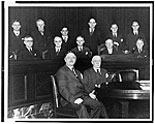The Wickersham Commission
In 1929, Herbert Hoover becomes the first new president to mention crime in his inaugural address when he proposes a federal effort to examine the issue. The resulting study, originally called the National Commission on Law Observance and Enforcement, is more popularly known as the Wickersham Commission, after its chairman, George W. Wickersham.
In 1931, the commission publishes 14 reports on a variety of topics, from police behavior to crime causation. It is no perfunctory exercise. The Wickersham effort unearths and records a multitude of alarming examples of misconduct, brutality, and ineffectiveness within the country's criminal justice system. In particular, it notes that Prohibition is unenforceable, that politics have a corrupting influence, and that the third-degree and police brutality are rampant. It calls for better training and record-keeping as well as the establishment of state law enforcement bureaus. The Wickersham Commission is the most famous of many similar efforts on the local and national level. The commission's efforts get a lot of attention, but the Great Depression has begun, and the funding needed to address these issues is hard to come by.
 |
| Crime commission heads grilled by Congress on juryless rum trials Dean Roscoe Pound and Hon. George S. Wickersham, shown with ten other members of President Hoover's Crime Commission, appearing before the Judiciary Committee of the House to explain their plan to speed up court procedure by trying certain liquor cases without a jury. 1930 Library of Congress |